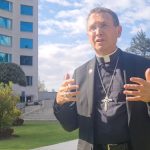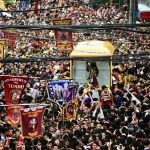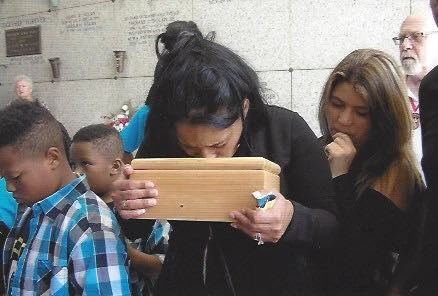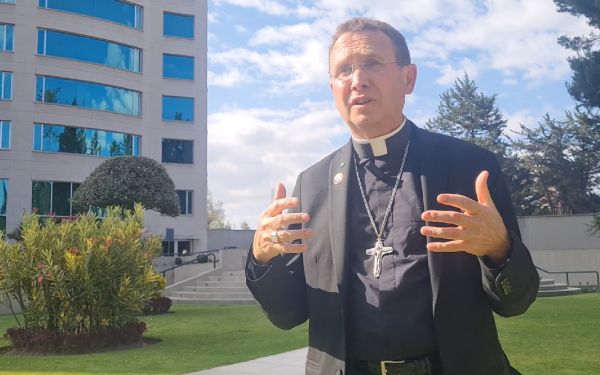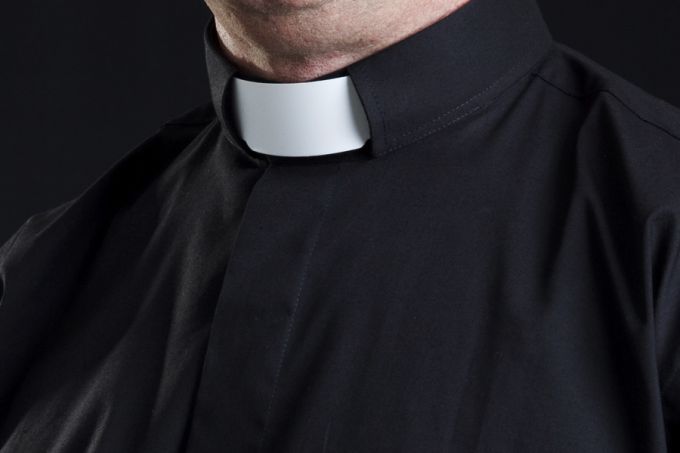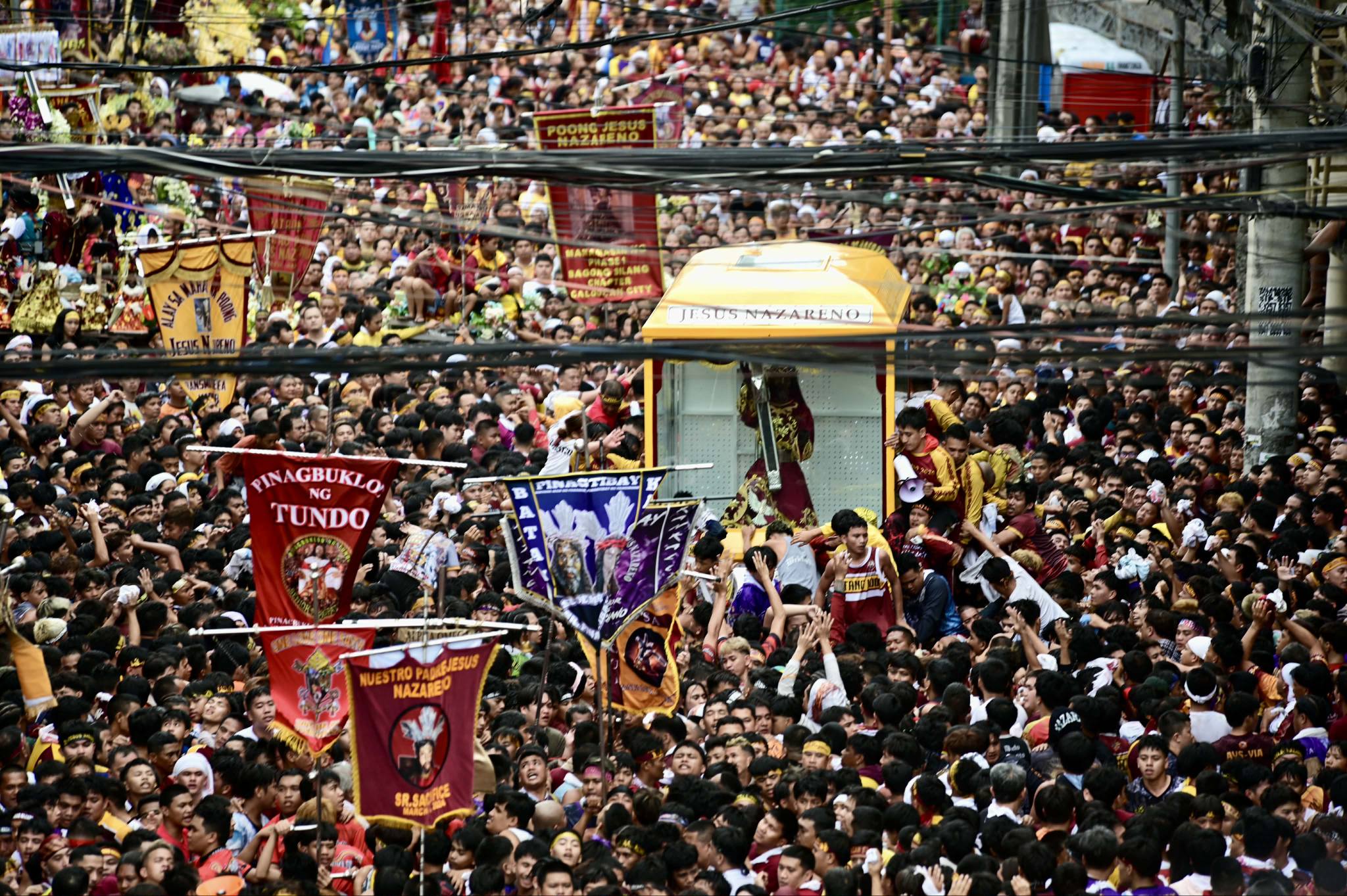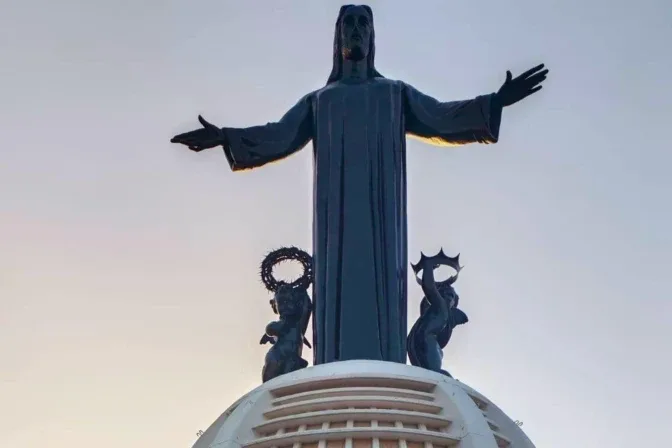
A family grieves their lost baby at a funeral at the crypt at St. Patrick’s Cemetery in New Orleans. Many friends, relatives, and families attended the funeral that day. / Credit: Photo courtesy of Compassionate Burials for Indigent Babies
CNA Staff, Nov 19, 2025 / 06:00 am (CNA).
Sandy Schaetz still mourns the baby she never met.
“It was terrifying and traumatic,” she said of her miscarriage. “I was consoled after by the prayers of a deacon, but never named the baby or knew if it was a boy or girl.”
“It was not something I understood at the time and I only wish I had known more of what was happening,” she told CNA.
Now, Schaetz volunteers with Compassionate Burials for Indigent Babies (CBIB), an organization that buries babies who died, whether stillborn, miscarried, or aborted.
The group organizes everything for the funerals, which are held at a crypt at St. Patrick’s Cemetery in New Orleans.
A shoebox-sized casket lined with donated white fabric, usually from wedding dresses, is processed through the cemetery, with Knights of Columbus present as the honor guard. A volunteer musician plays at every funeral; a Catholic deacon presides at almost every burial.

When Schaetz attended her first burial service as a volunteer, it hit her to the core.
“I find it difficult to put into words how it affected me,” Schaetz said. “All God needed me to do that day was to be present, to pray, to honor the life he had created.”
“It opened my eyes to how each life is such a gift, and when that life ends how important it is to show respect and pray for the soul and bury the dead with love,” Schaetz said.
Death and resurrection
Women who lose children through miscarriage often suffer silently, according to Lise Naccari, the founder of CBIB.
“Losing a child is hard. Often women suffer in silence the pain of infant loss and ride that sad emotional roller coaster ride alone,” Naccari told CNA.
One in four pregnancies ends in miscarriage — a devastating statistic for many couples.
Naccari herself experienced a miscarriage as well as several challenging pregnancies.
“I feel a special connection with poor mothers who have lost a child. My heart goes out to them,” Naccari said.

Naccari buries the babies who were wanted and loved, but also the babies who were thrown out or mistreated.
“CBIB has buried babies as big as a blueberry and up to 2 years old,” Naccari said. “We buried babies stillborn, miscarried, abandoned, unclaimed, aborted, murdered, and thrown away in the trash — and every situation possible.”
“Many babies were mistreated, abused, and tossed out … these are heartbreaking funerals to go to,” Naccari said.

“Babies are left sometimes because some families can not afford funerals for them but would like one,” Naccari said. “Also, many parents are young, and the grief can be overwhelming and they cannot navigate through funeral arrangements.”
Her life’s work is to bury the dead — and she looks to the Resurrection.
“I consider what I do holy,” Naccari said. “I feel like this is my vocation and I know God orchestrated all of this. I give all honor and glory to him, our loving Father.”
“What I do is not about sorrow and death,” Naccari continued. “What I do is really about joy and life — eternal life.”

It’s not an easy job, and Naccari looks to God for strength.
“Lord, I don’t want to do this anymore. It hurts my heart too much,” Naccari remembered praying as she prepared one baby for burial — a baby girl who had been abandoned and tossed out after she was born.
“I felt a still small voice within me say, ‘Lise, don’t think about their bodies, focus on the Resurrection,’” Naccari recalled.
“The sunlight from the stained-glass windows was shining down a warm yellow color on my face, as I looked up in it and I thought, yes, this is what I needed to hear to keep going — focus on the Resurrection,” she continued.
A resource for women in need
Sheena Lewis was in jail when her son, still a baby, passed away. She couldn’t attend the funeral, but Naccari organized the burial for her.
Lewis, now sober and out of jail, visits her son’s crypt often.
“I have solace in the fact he was laid to rest in a beautiful manner when I couldn’t be there for him or myself at the time,” Lewis told CNA.
Many young mothers CBIB helps are often “steeped in poverty” and have no support system. They are often “low income, uneducated, coming from sometimes addiction or problem homes,” Naccari said.
“Often I find at these funerals that the young mothers are alone or they may come with children or other women — but there are no men to help support them,” Naccari said.
“My heart is broken for them, for they are not only battling their poverty, they also have to deal with losing a child,” she said.
A moment to mourn
Funerals help families process their grief — a grief that’s often hidden away due to the nature of miscarriages.
Deacon Ricky Suprean preaches at almost every graveside burial — but after a couple years of volunteering, he realized God had called him to this so he could find healing.
Suprean and his wife, Lynn, experienced two miscarriages.
Suprean struggled to process it at the time, but through his volunteering, he’s found some healing. He still remembers the first CBIB funeral he presided at.
“I felt the power of life that day,” he told CNA. “It was cold. I had no idea I would kneel in front of each little coffin and pray for each child and each family with my hand touching each coffin.”
Volunteers hugged each family member, he recalled.

“God has allowed me to give a proper burial to my own two lost children through CBIB time and time again,” Suprean said.
“God created these children in my wife’s womb, and they will be waiting for us in heaven,” Suprean continued.
Struggling to process grief is common with loss of children, according to Naccari.
“Too often people are hurting so much and don’t want to face a funeral,” Naccari said. “They feel vulnerable and so it is easier to turn away and do nothing.”
“But on the contrary, I have observed that these funerals provide consolation, comfort, solace, and even a healthy way of healing after the loss of a baby,” Naccari said.
“It’s a good grief,” Naccari continued. “Funerals are about love and holding onto friends and family at a time of need. It can be life-changing.”
Some funerals have had as many as 100 people in attendance.
Many volunteers are “faithfully committed” to being present at every funeral.
“It could be freezing cold or blistering hot in the summer, but they just show up and either help set up, greet the parents, or stand tall next to a casket to show the love of Jesus to our families,” Naccari said.

These funerals “allow parents that special moment to mourn their loss and to remember their little one and ponder the person that little one could have been,” Naccari said.
“CBIB celebrates each life, and we believe that God somehow rights all the wrongs and makes all things new,” Naccari said. “And then we move to the next funeral.”




